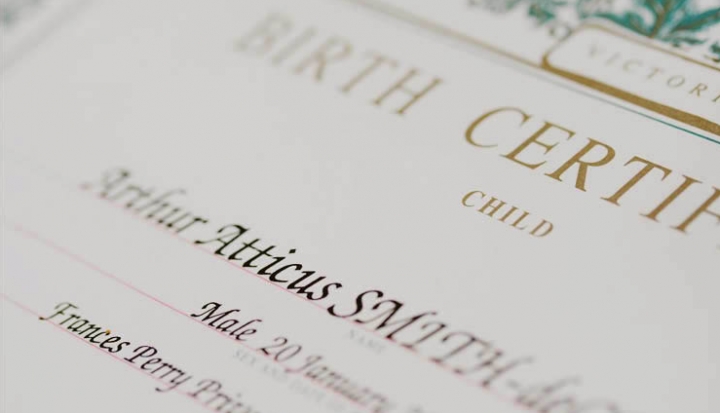By John Delaney
This article appeared in the November 1983 issue of U.S. Catholic (Vol. 48, No. 11, pages 31-33).
Among the Catholic customs that went out the window when Pope John XXIII “opened the windows” of the church to let in fresh air was the practice of parents naming their children after saints. Not too long ago such names as Mary, Anne, Teresa, Catherine, and John, James, Thomas, and Michael were widely bestowed on children. Nowadays many parents prefer more exotic names chosen for how they sound—the more unusual and bizarre, the more desirable—or how they look in print, rather than for any meaning.
Lest anyone blame this trend on Pope John or Vatican II, I hasten to point out the trend is equally prevalent in secular circles. When last did you run across a child with the name Patrick Henry or Thomas Jefferson or Woodrow Wilson or Franklin Roosevelt? And yet only a few years ago it was common practice to name children after great political figures whose actions had so impressed the parents.
Why have parents become so wary of giving their children names with meaning, and instead bestow on them names that sound pretty and/or look good in print? One prime reason, I suspect, is because of general disillusionment on the part of many with the past, the demystification of heroes, and the decline of hero worship.
In no small measure the responsibility rests squarely on the shoulders of the media and their treatment of public figures the past two or three decades. No sooner does a man or a woman become a visible public figure than the media seem determined to reveal all the person’s foibles and weaknesses—often in a vicious manner by scandal sheets that masquerade under the façade of publishing “the truth” about them. Respect for prominent figures is practically nonexistent among a large segment of the press; and the more blatant the attack or “revelation,” the more gleefully it is blazoned across the front pages of newspapers or on the front covers of magazines.
Television too has added its voice to the chorus of muckraking, to use an old-fashioned word, by certain programs that demean and denigrate great figures, dwelling almost exclusively on their shortcomings. And this approach is duplicated on the historical scene by revisionists and historians who delight in unearthing and emphasizing the most unsavory aspects of their lives of great historical figures. And of course there is the recent spate of “Mommy Dearest” type books in which a child excoriates his or her parent and relates in minute detail how the parent mistreated him or her.
In view of this concerted attack on the whole concept of heroes and heroines it is small wonder that so many younger people reject any heroic or authority figure. And it’s no wonder they have the feeling that they have nothing to thank the past for, since no good ever came from it—so why obey anyone in authority today?
Unfortunately, much of this disillusionment with heroic figures of the past rubbed off on attitudes toward the saints. It is true that hagiography—the study and biography of saints—in the past was often so adulatory as to tend toward superstition. And in some cases it bordered on idolatry, with the saints emerging as plastic, pietistic figures that had little reality or appeal in the 20th century. But for the pendulum to have swung to the other extreme—as seems to have happened in the past two decades when the saints have been all but abandoned by so many Catholics—is just plain ridiculous. For saints rightfully are an integral part of Catholic tradition and life; this has always been so, should be today, and will be in the future. So it is important for Catholics to understand the whole concept of sainthood and to restore their attitude toward the saints to its proper niche in the church.
One way to do so is to resume the practice of naming children after the saints. Not indiscriminately, but with understanding and reason. By understanding I mean the parents should understand the role of the saints in the church and should appreciate the actions of any saint against the background of his or her times; and by reason I mean parents should select a saint after whom to name their child based on that saint’s relevance to our times and the witness the saint’s life and activities give to the teachings of the Lord. The time is long overdue for Catholics to give their own witness in such an act.
But selecting the child’s name is just the beginning. Children should early be made aware of why their parents selected that particular name. I wonder how many children today can tell why their parents gave them the name they did; indeed how many parents have even bothered to tell their children why they bear the names they do? Very few, I dare say, which is most unfortunate.
I would suggest that every parent explain to his or her children why they were named as they were. When a saint’s name is used, parents should explain what qualities are exemplified by that particular saint that are desirable for the child to emulate, and how in today’s world those qualities can best be expressed and put into action. By the time children reach maturity, they should be an authority on the name they bear.
In this connection it seems to me the schools and churches have long been remiss in teaching about saints. A small example: I attended a Catholic elementary school named St. Columba’s. I was well into adulthood before I knew who St. Columba was. Nobody in that school or church had ever explained who he was. And I hasten to add it was an excellent school that I remember with great affection and appreciation for the outstanding education I received in those eight years. At the very least, every graduate of any Catholic school named after a saint should be taught about that particular saint.
Similarly, how many people who attend a church named after a saint have any but the most cursory, if any, knowledge of that saint? An annual homily on the life of the church’s patron saint is a must for every parish. Recently a teacher in a C.C.D. class wrote me that she was requiring every child in her class to write an essay on the saint after whom he or she was named. I would heartily endorse such a program for every parochial-school class, though I suggest caution should have been exercised so as not to offend children not having a saint’s name. A further advantage of such a program would be the opportunity it would give the instructor to talk a bit about church history—a sadly neglected area.
I am not suggesting that every saint’s life or name is suitable for today’s children. For example, I doubt very much if St. Simeon Stylites the Younger, who lived on a pillar for 68 years, would have much attraction for today’s youngsters. Nor would many children want to be given such names as Hegesippus or Walburga or Malrubius or Euphemia—all perfectly acceptable names for their times and borne by saintly people, but hardly 20th-century names. But among the thousands and thousands of men and women called saints, there is the widest variety of names perfectly acceptable in the 20th century. People seeking a name for a child should secure a good volume of lives of the saints, but also for saints who represent the qualities they would like to see in their daughter or son.
But even with all the care and attention parents might give to selecting a name for their son or daughter, the child may not like the name he or she has been given. In that case I would suggest that children be allowed to select their own names when they reach their 18th birthday. If a child has been well-grounded in the background of the saints, he or she might very well choose to keep the name given, after due reflection; or if he or she then decided to select a new name, the selection might very well be that of another saint whose characteristics and activities the child admires.
Too often today young people tend to admire some of the grossest products of our society—entertainers whose lifestyles are deplorable, underworld characters who “have it made,” athletes who flaunt their eccentricities, political and business leaders, whose excesses are immoral—rather than those who heed the admonitions of the Lord and try to follow his example. Such a condition calls for remedies to return a sense of morality and responsibility to our society.
One method to help achieve this laudable goal is to emphasize the desirability of returning to the practice of naming children after persons worthy of emulation—names that have meaning. Let’s give children real heroes and heroines to follow rather than a shoddy example of so many of those masquerading as heroes and heroines today. Let’s bring the whole business of heroes and heroines back into proper perspective by once again instilling into children regard for our true heroes and heroines. Let’s give them examples of flesh-and-blood people who performed heroically, were real human beings, and lived lives that can serve as examples for living today. And where better can we find such examples than among that goodly company we call saints?
Image: Flickr photo cc by penelope waits













Add comment